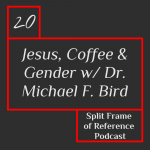The dynamic theory of biblical inspiration sees a concursive operation of divine and human elements involved in the process of writing Scripture. The Spirit of God directed the writer’s thoughts and concepts, while allowing their respective personality, style, and disposition to come into play with the choice of words and expressions. Here inspiration is largely conceptual.[1] Bloesch states: “The writers [of Scripture] are assisted and led by the Spirit of God rather than being pens of the Spirit, who alone is the actual author of Scripture. … Inspiration is the divine election and superintendence of particular writers and writings in order to ensure a trustworthy and potent witness.”[2]
My suggestion is that if we take into account the didactic witness of Scripture to itself as well as the phenomenon of Scripture, the best model for the inspiration of Scripture is the dynamic view.
First, inspiration involves a type of supernatural and superintending synapses (i.e. a conjunction) between God’s purposes and their expression in the minds of the individual authors. This synapses happens in different ways, for example, there is a difference in the degree of divine direction between “This is what the LORD, the God of Israel, says: ‘Write in a book all the words I have spoken to you’” (Jer 30:2) and “Now about virgins: I have no command from the Lord, but I give a judgment as one who by the Lord’s mercy is trustworthy” (1 Cor 7:25).[3] The difference is divine dictation (which does happen in Scripture) and Paul’s need to do some theological and pastoral improvisation when he lacks dominical declarations on a tricky topic (which he did with the Spirit’s guidance). Similarly, there is a different type of divine influence exerted upon the composition of a Psalm by an author and its collection by a redactor. Inspiration is indeed concursive, it brings divine intent and human activity together, but it is a dynamic rather than a monolithic or mechanical process, pertaining primarily to cognition with a view to composition or some other activity that will actualize the canon.
Second, inspiration takes place primarily at the conceptual level. This is not to say that God simply gives an author the gist of what he wants them to say.[4] As if God tells the Psalmist to write something poetic about God as a Shepherd which leads him to write Psalm 23 or as if God gives Paul a few ideas about love which he then turns into the ode to love in 1 Corinthians 13. Yet inspiration means stimulating the mind to reach for words, but falling short of giving them. Now obviously, you cannot have concepts without words, so there is admittedly some overlap with the verbal model insofar as “the words of human beings are adopted to serve God’s purposes.”[5]However, I’m inclined to say that human authors are directly inspired and it is in a derivative way that their words as the product of that process are inspired. God provides the concepts, the Spirit initiates and superintends the concursive operation of divine influence and human cognition, resulting a composition dually authored by God and human authors. Then, the Spirit continues to guide the whole process of collection and canonization to ensure that God’s word is communicated and effective.[6]
The dynamic view of inspiration tells us, though without giving us a description of the exact cognitive process, that these human words can be identified with God’s Word. Thus we can legitimately say that it is not only Ezekiel, Amos, Jeremiah, Matthew, Paul, or Peter who speaks to us, but God is the one speaking through them to the church. It is God’s voice that is heard through the grammar, style, and words of the authors. However, authors are inspired at the level of concept, framework, worldview, and idea. Their own style, personality, vocabulary, and even their idiosyncrasies come out—not despite inspiration but in tandem with it.
Reformed theologian Loraine Boettner used a horse, rider, and bridle analogy to show that inspiration utilized a person’s personality and mind rather than over-powering it:
Inspiration must have been somewhat like the touch of the driver on the reins of the racing steeds. The preservation of the individual styles and mannerisms indicates as much. Under this providential control the prophets were so governed that while their humanity was not superseded, their words to the people were God’s words and have been accepted as such by the Church in all ages.… Hence we see that the Christian doctrine of inspiration is not the mechanical lifeless process which unfriendly critics have often represented it to be. Rather it calls the whole personality of the prophet into action, giving full play to his own literary style and mannerisms, taking into consideration the preparation given the prophet in order that he might deliver a particular kind of message, and allowing for the use of other documents or sources of information as these were needed. If these facts were kept more clearly in mind the doctrine of inspiration would not be so summarily set aside nor so unreasonably attacked by otherwise cautious and reverent scholars.[7]
[1] I. Howard Marshall, Biblical Inspiration (Grand Rapids: Eerdmans, 1982), 31-47; Clark Pinnock, The Scripture Principle (San Francisco: Harper & Row, 1984), 63-64; Donald Bloesch, Holy Scripture: Revelation, Inspiration and Interpretation (Downers Grove, IL: InterVarsity Press, 1994), 119-20. John Dick (cited in Alexander Carson, The Inspiration of the Scriptures [New York: Edward W. Fletcher, 1853], 240-41): “I define inspiration to be an influence of the Holy Ghost on the understandings, imaginations, memories, and other mental powers of the sacred writers, by which they were qualified to communicate to the world the knowledge of the will of God.”
[2] Bloesch, Holy Scripture, 119.
[3] Shead, Mouth Full of Fire, 259 n. 77.
[4] Against Timothy Ward (Words of Life: Scripture as the Living and Active Word of God [Nottingham, UK: Apollos, 2009], 87–88) this is more than God giving the biblical authors “clues” and then leaving them “to their own devices.” What I envisage is the active power of God enabling the authors to be themselves in their own words, to communicate that which God fully intends through the agency of the author.
[5] Bloesch, Holy Scripture, 120.
[6] As long as one does not propose that God directly gives words to the authors or chooses the words for them, I’m happy with a definition of inspiration like that stated by David S. Dockery (Christian Scripture: An Evangelical Perspective on Inspiration, Authority and Interpretation [Nashville, TN: B&H, 1994], 240): “The superintending influence the Holy Spirit exerted on the biblical writers, so that the accent and interpretation of God’s revelation have been recorded as God intended so that the Bible is actually the word of God.”
[7] Loraine Boettner, The Inspiration of the Scriptures (Grand Rapids: Eerdmans, 1940), 25–27.
Photo: Wikimedia commons.












